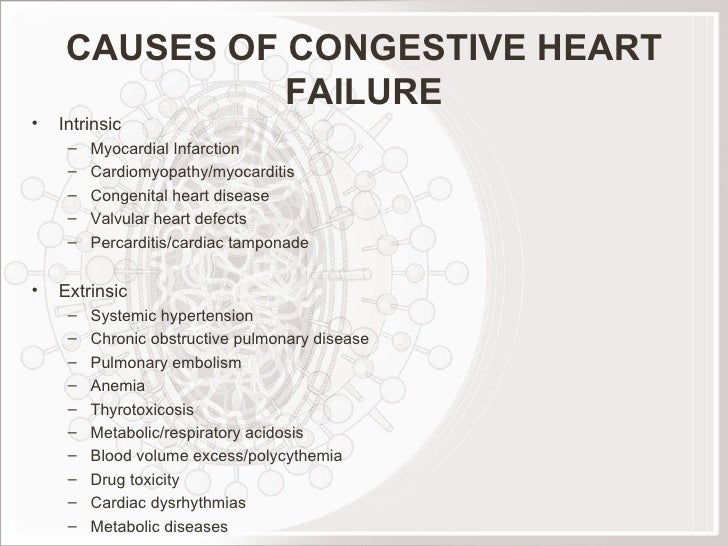
Image source: https://image.slidesharecdn.com/heartfailure-090305183554-phpapp02/95/heart-failure-7-728.jpg?cb=1236278199
What do you mean by Congestive heart failure?
People believe that the term heart failure means heart has stopped working. But actually heart failure is called for the weak pumping performance of heart while compared with the normal pumping power of heart. When heart failure occurs, the blood flow through the heart and body will be at slow rate causing the pressure in the heart to rise high. As a result the heart wouldnt be able to pump sufficient oxygen and nutrients to various parts of the body as per the requirement of the body. Due to this the heart chambers will be stretching to hold more blood to supply throughout the body. Even though this condition will promote blood flow, it may weaken the heart muscle by affecting its pumping efficiency. As a result the kidneys retain the fluids and salts in the body. . If this fluid builds up in the arms, legs, ankles, feet, lungs, or any other organs, the body will becomes congested. Hence congestive heart failure is the term used to describe this condition.
What are the causes for Heart failure?
Coronary artery disease
A condition in which the heart will starve for oxygen rich blood due to blockages or narrowing of coronary arteries
Heart attack
A condition in which complete blood flow to the heart muscle is stopped or diminished due to coronary artery disease.
Cardiomyopathy
Damage to the heart muscle due to any infections or usage of alcohol and drugs
Conditions causing the heart to work hard
The conditions that causes the heart to work hard are
High blood pressure
Valve disease
Thyroid disease
Kidney disease
Diabetes
Congenital heart disease (inborn birth defect of heart)
What are the symptoms for heart failure??
The problem with the heart failure is that many people may not be experiencing any symptoms or in other words we can say that the symptoms for heart failure may be mild for many persons. The symptoms for heart failure in patients may be constant or will come and go.
The earlier symptoms for heart failure are
Feeling tiredness than usual
If required blood is not received by organs and muscle, this will make the patient tired and weak. Likewise insufficient blood to brain can make dizziness
Weight gain (even though the dietary habits are not changed)
Appearance of swellings in feet, ankles, and legs.
Increased need to urinate (especially at night)
Symptoms when the condition is worsened
Irregular heart beat
Wheezing
Cough that develops from congested lungs
Congested lungs- will experience difficulty in breathing due to congested lungs (fluid back up in lungs). This fluid back up can cause cough and wheezing.
Symptoms when immediate medical care required
Will experience a chest pain that will radiates through the upper body. In some cases this can also be a sign of a heart attack
Will experience rapid breathing.
The fast pumping of heart to pump required blood results in rapid or irregular heart beat
Skin will appear as blue due to the lack of oxygen in lungs
Fainting
How to diagnosis heart failure??
After consulting a health provider, he may be referring the patient to a cardiologist. The heart specialist will examine the patient by checking heart rhythms and may prescribe for specific diagnostic tests to examine your hearts valves, blood vessels, and chambers. The specific diagnostic test may include
Magnetic resonance imaging (MRI) done to take pictures of the heart
Stress tests done to check how your heart performs under different levels of stress
Blood tests done to check for abnormal blood cells and infections
Medications and treatments for heart failure
Medications prescribed will be
ACE Inhibitors (Angiotensin Converting Enzyme Inhibitors)
Beta-Blockers
Diuretics
Surgeries prescribed will be
Angioplasty
Heart valve repair surgery
